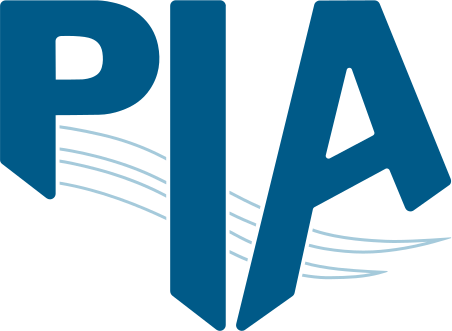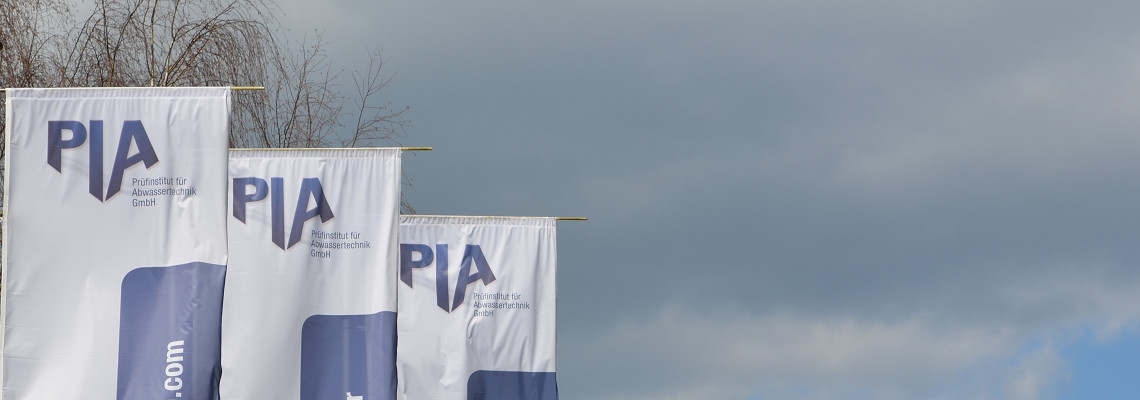General Terms and Conditions
- of the
PIA - Prüfinstitut für Abwassertechnik GmbH - Hergenrather Weg 30
- 52074 Aachen
- 1.
- 1.1
- The PIA - Prüfinstitut für Abwassertechnik GmbH (hereafter: the PIA) provides services in the waste water, drinking water, environmental and marine technology sector. These take the form of surveys, inspections and tests and measurements, plus laboratory and analysis services. These general terms and conditions apply to all of the PIA’s services, including ancillary services. These general terms and conditions only apply in relation to companies.
- 1.2
- Any general terms and conditions that the customer has do not apply and are hereby excluded.
- 2. Type and scope of the services
- 2.1
- The PIA is entitled to determine the type and method of tests and inspections according to its professional judgement, unless any agreement to the contrary has been made or any mandatory regulations necessitate a particular approach.
- 2.2
- When performing these duties, the PIA does not provide any guarantees with respect to the suitability and functionality of the products which are the object of the PIA’s services. In particular, the PIA does not provide any guarantees with respect to the products’ design, choice of materials used, execution and usability.
- 2.3
- When performing the requested tests and inspections, the PIA is not responsible for the applicability of the rules that form the basis of the tests and inspections, unless otherwise has been agreed in writing. The PIA will also not examine such rules.
2.4
Conformity is the fulfilment and compliance of a product or system of/with a defined specification or normative requirement. When a statement of conformity to a specification or standard is provided ("passed"/"failed"; "within tolerance"/"out of tolerance"; "performance class I" or comparable statements), a decision rule shall be documented as to how the measurement uncertainty is taken into account in this conformity decision.
In case of qualitative single observations (e.g. "water leakage observed: yes/no") the application of a decision rule is usually not possible or preferrable.
In case of quantitative observations (e.g. measured value X ≤ limit value Y), a specific decision rule may have to be applied due to normative specifications or customer requirements, usually to increase the statistical certainty against false acceptance or rejection (e.g. measured value X + measurement uncertainty U ≤ limit value Y).
PIA GmbH specifies that the measurement uncertainty is generally disregarded in conformity decisions, unless normative requirements or customer requirements specify otherwise. An individual decision rule may be applied at the customer's request (for example, to meet additional requirements of national authorities), provided that there are no explicit normative rules to the contrary. The specification or standard and the decision rule to be applied shall be clearly defined. Individual customer requirements must be communicated with PIA GmbH before the start of each test.
- 3. Realisation of contracts
- All of the PIA’s quotations are subject to confirmation. A contract only comes into being upon written confirmation of the order by the PIA or by execution of the order. Alterations and additions require written confirmation by the PIA.
- 4. Language
-
The PIA produces written copies of its surveys, test reports and other results relating to its services exclusively in German or English language. If the creation of such documents is desired in a different language, this must be explicitly agreed when the order is placed.
- 5. The customer’s obligation to cooperate
- 5.1
- The customer must ensure that the PIA is provided with all the information necessary for it to execute the contracted services before the PIA commences delivering its services. This information must be provided free of charge. This includes in particular the necessary drawings, plus information on the construction materials being tested or inspected and the components used in the entire range (when inspecting tanks) and instructions for installing, commissioning, operating and maintaining the product (for inspecting the treatment efficiency).
- 5.2
- The PIA is responsible for setting up/mounting the products in testing stations. Installation and connection of the products is the customer’s responsibility, and occurs at the customer’s own risk and cost. The customer undertakes to perform all duties under this obligation to cooperate in such a way that they comply with all relevant valid legal provisions, standards, safety regulations and regulations on the prevention of accidents.
- 5.3
- The customer also guarantees that all personnel sent to the PIA’s premises in order to perform duties forming part of their obligation to cooperate will observe the PIA’s company rules and work instructions.
- 5.4
- The customer will bear all resulting costs if provision of the services is hindered by late, incorrect or incomplete information, or if personnel do not dutifully perform the duties that represent the customer’s obligation to cooperate. This obligation to reimburse costs relating to relevant complications applies irrespective of whether a fixed price was agreed for the provision of the agreed service(s).
- 6. Deliveries
- 6.1
- Deliveries of products, materials, information or equipment must occur during the PIA’s official delivery hours of 08:00–15:00, Monday to Friday. Any deliveries outside these official delivery hours must be agreed separately.
- 6.2
- Before products or devices etc. are delivered, the customer must inform the PIA of the product’s dimensions and weight, along with the type, dimensions and positioning of any necessary connections. Before delivery takes place, the customer must inform the PIA about the tank’s material and weight, along with the type of delivery vehicle that will be used.
- 6.3
- The PIA has a forklift truck with a maximum load capacity of 5.0 tonnes. In the event that an object that will be delivered exceeds this total weight, the customer must inform the PIA in sufficient time before delivery. In liaison with the PIA, the customer is then obliged to order a suitable forklift or crane at the customer's own cost.
- 7. Destruction and collection of sample material
- The PIA and the customer agree that objects the customer provides to the PIA in order for the PIA to be able to undertake the agreed services, in particular sample material and test products, can be destroyed once the services have been performed. The customer will bear the necessary costs for their proper disposal. Should the customer not agree that such objects can be destroyed, the customer must inform the PIA of this before providing the PIA with the objects. Upon completion of the agreed services by the PIA, the PIA will inform the customer that these objects can be collected. They must be collected during the PIA’s official collection hours of 08:00–15:00, Monday to Friday. The customer must notify the PIA of the specific time the objects will be collected at least one complete working day in advance, so that the PIA can make the necessary arrangements. Should the customer not collect these objects at the stated time, the customer must compensate the PIA for the additional expenses that result. These reimbursable additional expenses include, in particular, storage costs.
- 8. Deadlines for provision of services
- In the event that the PIA and the customer agree deadlines for provision of the services, these only begin to take effect once the customer has fulfilled all its obligations to cooperate.
- 9. Offsetting
- The customer is only permitted to offset the PIA’s entitlement to payment if the claim is undisputed or has been legally established.
- 10. Defect rights and liability
- 10.1
- The PIA guarantees the contractual quality of its services, in accordance with the statutory provisions of the German Civil Code (BGB).
- 10.2
- The PIA’s liability for compensation is restricted as follows:
- a)
- In the event of simple negligence, liability is borne solely for loss of life or limb or impairment to health;
- b)
- In the event of wilful intent by agents and of gross negligence by legal representatives, employees or agents, liability is borne solely for foreseeable damages of the type that typically arise; the restriction does not apply to damage resulting from loss of life or limb or impairment to health;
- c)
- In the event of a breach of a cardinal obligation, and in deviation to a), the PIA bears liability for simple negligence, however this is restricted as under b); a cardinal obligation is an obligation that must be fulfilled in order for it to be possible to properly fulfil the contract, and which the contractual partner can regularly expect to be fulfilled.
- d)
- The mandatory provisions of the product liability law remain unaffected, as well as liability in the event of a warranty. In the event of any other breach of duty, especially fault upon conclusion of the contract, default or criminal offence, the PIA does not assume any liability greater than that detailed above.
- e)
- The PIA’s legal representatives, executives and employees cannot be held liable to a greater extent than the PIA itself.
- 10.3
- The PIA is not responsible for accidental deterioration or degradation of the test object, the customer’s test equipment or peripheral equipment.
- 11. Legal status/Place of fulfilment/Applicable law
- 11.1
- The contract concluded between the PIA and the customer is - subject to the provisions of mandatory international private law - governed by the laws of the Federal Republic of Germany, to the exclusion of the UN Convention on Contracts for the International Sale of Goods.
- 11.2
- If the customer is a commercial entity under the terms of Section 1, Paragraph 1 of the German Commercial Code (HGB), a legal entity under public law or a special fund under public law, the law in Aachen, Germany, exclusively applies to all disputes resulting from, or in conjunction with, the respective contractual relationship.
- 11.3
- Provided that this contract contains no special provisions to the contrary, the generally applicable legal provisions of the laws of the Federal Republic of Germany and the European Union apply. Should individual clauses of this contract be found to be invalid or void, the validity of the remaining clauses remains unaffected. In such a case, the partners are obliged to replace the defective clause with one whose legal and economic meaning comes the closest to the clause found to be invalid or void.
Aachen, June 21st 2023
PIA Prüfinstitut für Abwassertechnik GmbH

